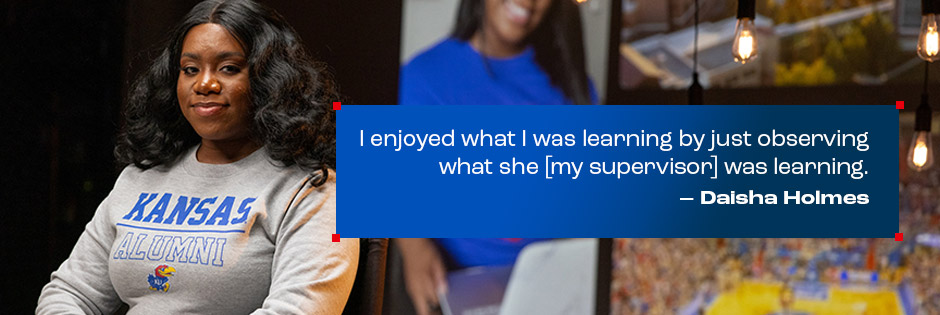Students in the Organizational Communication Master’s Program Learn Valuable Skills to Apply in a Variety of Industries and Occupations

Two current students and one recent KU graduate chose the Master of Arts in Organizational Communication degree program to help advance their careers and cultivate useful workplace communication skills. All three are employed in roles that require engagement with multiple stakeholders and groups.
The organizational communication master’s degree and certificate programs are supported by the Johnson County Education Research Triangle (JCERT).
Why they chose the organizational communication graduate degree program
Recent KU graduate Daisha Holmes never expected to pursue a graduate degree. Holmes is a specialized grant program manager at Johnson County Community College. “I work in financial aid,” she said. It wasn’t until her supervisor encouraged her to take a look at the master’s degree in organizational communication offered at KU. “My supervisor was a student in the program at the time and invited me to shadow her for a few of the classes,” Holmes said. “I jumped at the opportunity to join her. I enjoyed what I was learning by just observing what she was learning.”
She and her supervisor had discussed how well the program’s curriculum aligned with the work they do in financial aid and higher education.
Tayler Loudermill began her professional career working in the classroom as a middle school teacher. Two years ago, she transitioned to a different educational role. Loudermill currently works as a trainer in the Learning and Development department of human resources for the City of Overland Park. “I chose the organizational communication master’s program at KU because I am seeking to advance my career in HR,” Loudermill said. “Everyone I know went to KU, so I have always had great respect for the university. I knew I was going to receive a great education.”
Daniel Everhart is a sergeant with the Wyandotte County Sheriff’s Office, a captain and military police officer in the U.S. Marine Corps Reserves, and a current student in the organizational communication graduate program. Everhart is on track to graduate in May and is busy working on his capstone project, and preparing for drills coming up in March. “I chose the organizational communication master’s degree because of my current leadership roles and my interest in additional leadership training,” he said.
The program is heavily focused on applied research.
Jordan Atkinson, professor of the practice and organizational communication program director, said the program provides students with research-based insights and tools that promote communication skills across diverse groups and contexts.
“There is a lot of reading, writing, and research involved in the courses in the program,” Holmes said. “For my capstone project, I integrated knowledge from my various classes that included research, writing, and interviewing skills.”
Holmes’ capstone project was well-received and Atkinson invited her to present her project at the Eastern Communication Association annual convention in Cambridge, Massachusetts, last spring. She said Atkinson encouraged and supported her all the way. “Every time we had our meeting to discuss the project, he kept pushing me forward. It was hard work, but a great educational experience for me.”
Loudermill has about a year to go until graduation, but she is already thinking about her capstone project. She has been researching generational diversity in the workplace. “We now have a workforce of four generations,” she said. “I am responsible for training city employees ranging in tenure from entry level to longtime workers. I administer new hire orientation and continuing education training, so there is a wide spectrum of learning and communication styles among these groups.”
For his capstone project, Everhart is developing a four-phased new hire onboarding program. “The goal is to help better prepare new hires for training,” he said. “I plan to incorporate assimilation theory, uncertainty management theory, social exchange theory, and social identity theory into this project.”
Who should consider this degree program?
The Master of Arts in Organizational Communication is designed for early- and mid-career professionals who are seeking to develop an advanced set of communication skills to better understand and manage organizational culture, build effective employee onboarding and training programs, lead teams, and advance their careers.
The degree is applicable to a wide range of industries that include higher education, human resources, law enforcement, and industries in the public, private, and nonprofit sectors.
How to apply
Prospective students are encouraged to apply online or reach out to the program’s academic advisor, Kristy Magee with questions.





